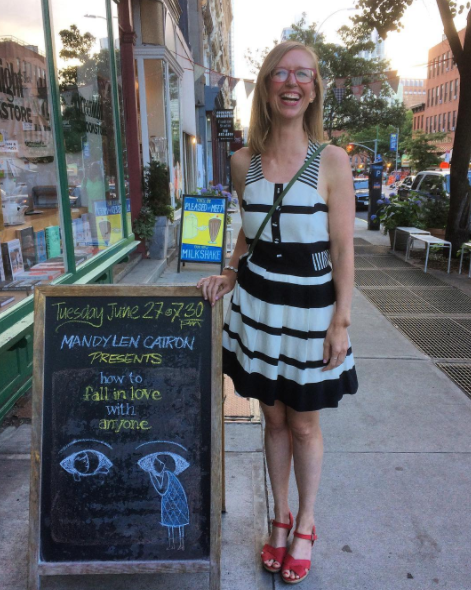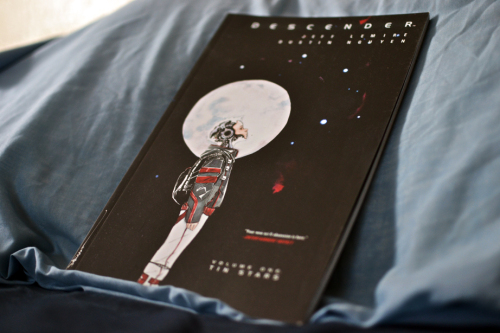This thing that takes up your whole life, your whole body, your whole mind; it’s all your dreams, and then suddenly […] it’s going to be just one little tiny tile on iTunes, one little tiny click. It’s not gonna be this thing that’s my feeling of my entire insides and my whole soul shape. It’s just gonna be a little square that people can choose. And that’s a really awful feeling.
Jill Soloway on making Afternoon Delight. On Fresh Air
About a month before my book came out I wrote Soloway’s quote in my journal. I was hoping, I guess, to keep things in perspective. Publishing a book I’d been working on for eight years felt enormous, but I wanted to remember that it was also small. It was a tiny tile on Amazon. It was a set of bound pages that would, for a time, live on a bookshelf in a bookstore and then, eventually, be taken home to put on another shelf or, if it didn’t sell, sent back to the publisher’s warehouse. It would collect dust. It would get recycled. Yes, it might mean something to someone—if I was lucky, if I had done a good job, it might mean a lot to someone—but it would never mean as much to anyone as the writing of it had meant to me.
So I tried to prepare for this inevitable shift in perspective, for the moment the book would feel small. I waited for it. At the height of book tour chaos—when I was stuck in Detroit at midnight with no way to make it to Austin for the class I was supposed to teach the next morning—I even longed for it. I was sure that, even though it felt awful to Jill Soloway, it wouldn’t feel so bad to me. I was sure that seeing my book take its place amongst a zillion other books would be fine—because I was ready, already, to get started on a second book. There was work to do.
But before I could do that work, I had to write a bunch of articles and do a lot of interviews and go to a handful of cities and launch this thing that is in fact the shape of my soul into the world to live its own unpredictable life without me.
I’m not sure how anyone “keeps things in perspective” while talking about this part of her soul all day every day for three weeks straight. I don’t know what I was thinking. Or I do. I was thinking I could master my emotions. Because it’s easy to convince yourself that mastering your emotions is within your domain when you spend your days doing interviews about “choosing” to fall in love. Of course you can choose to glide right along, to believe that you will do the strange work of distilling years of reflection into four-minute local tv interviews and then return, focused and unharmed, to the daily work of being a writer.
There was, for the record, one perfect night at the Greenlight Bookstore in Brooklyn. It was the official day of publication (June 27) and the room was full and the crowd asked interesting questions and they laughed at all of my jokes. I felt perfectly self-possessed and proud of the thing I had made—as if this one evening was the rightful culmination of years of work and study. My partner and my best friend and my agent and my editor and my whole team at Simon & Schuster all stood in the crowd, along with some old friends I hadn’t seen in years. At the end, folks lined up to have me sign their books—which I knew they would do (I’d bought a box of pens just for that purpose!) but still it felt surreal. I was scared of misspelling someone’s name, of talking to one person for too long or not long enough, of seeming anything other than completely grateful that someone wanted to pay for this thing that was shaped like my soul.

I knew as soon as it was over that no event would ever go quite so perfectly, but that sense of possibility—that I was becoming the person I’d set out to be the day I first applied to do an MFA fifteen years ago—felt exciting. And this possibility is, I think, the central hope and promise of a book tour.
On the whole, the tour was equal parts fun and uncomfortable. Starting about two weeks before I left, I had a hard time sleeping. I could only make it partway through a meal without feeling nauseous. I eventually gave up and just ate and slept when I could and I was surprised to find that worked okay. I was so grateful to see friends I hadn’t seen in years—and to meet so many new people—but a short “how’s it going?” while I signed a book felt like a weird, inadequate approximation of friendship. By the end, I stopped getting so nervous about going on tv or radio, but I always felt borderline nauseous before a reading. Occasionally people spoke to me about their heartaches and I almost always felt like I was failing to offer the deep empathy I knew they were looking for.
Halfway through the tour I got a cold and I lost my voice just before I was scheduled to read at Powell’s—the best bookstore in America (you can argue this point but I’m convinced). I drank a lot of tea and spent most of the day communicating mime-style. When I stepped up to the microphone and tried to speak, the crowd made an audible sound of pity and the very nice people in the front row gave me cough drops and the organizers turned up the mic and somehow we all made it through the event.
Throughout everything I was inexpressibly grateful to have Mark with me. I was pleased when he said he wanted to come, but I was sure I would be just fine without him. Instead, I felt lonely on the days he wasn’t around, unmoored from anything familiar. There is a profound sense of displacement on a book tour, and he was my make-shift place–a home while not at home. That sounds cheesy, I know, but there is no clearer way to put it. Sometimes, in interviews, I felt so disingenuous in my advice about love. Find someone kind, I would say, that’s what the research says—as if this is a simple thing to do, as if love isn’t complicated by so many other desires and expectations. What I really meant was, find Mark. Love Mark. Love someone who will come with you from airport to airport, carrying your dress in the dry cleaner’s bag, and listen to you talk about your relationship to a room full of strangers. Love someone who will walk ten blocks to get you the good coffee while you change clothes/put on more makeup/pretend to nap. Love someone who is insufferably upbeat when the taxi arrives at five a.m.
I had always been so annoyed by those doubtless people who seem to love without reservation or qualification. And yet there I was. And what sensible thing can one possibly say to an interviewer about such unaccountable happiness in love, about such good luck?
I can’t say much more about it even now, except that this experience of putting the thing that is shaped like my soul out into the world, has left me disoriented in ways I couldn’t have predicted or controlled, despite my best efforts. And Mark has sat patiently while I’ve burst into tears over breakfast and been totally incapable of explaining why.
Maybe this is just how it goes when you try to get back to regular life and find yourself slowly begining to understand that the thing that is shaped like your soul, that is the feeling of your entire insides, is just a small thing after all. And knowing all of this going into the process—knowing that this enormous thing will become very small, knowing that having all your dreams come true never feels quite like you imagined it would, knowing that your relationship with conventional metrics of success has always been uneasy, knowing that you are in fact very lucky to have had these opportunities—might not add up to handling the experience gracefully.
I know this book is, by most definitions, a real success. But I worry about how it’s doing out there. I try to keep my distance from reviews, but it’s hard. I check the sales numbers too often. I compare myself to other writers, which leaves me feeling petty and small. I guess the truth is that there is no way to prepare for putting part of yourself out in the world, squishing it into soundbites, having strangers suddenly show interest in what you think, and then returning to regular life, the life you already loved. The real pleasure of being a writer isn’t being a Writer; it’s writing. But even that has failed me lately.
I have tried for weeks now to write this post. I wanted to make sense of the book tour on its own terms without veering into the the strange, anxious feelings that have emerged in its wake. But it seems the two things can’t be separated.
Over at LitHub Lan Samantha Chang says that new writers must protect themselves: “We must wall off our inner selves from the colonizing part that assesses, quantifies, judges.” But book tours are trips across the country (and the internet) where this inner life is very explicitly assessed, quantified, and judged. When I think about it this way, I wonder who could possibly emerge feeling whole?
Over the weekend I went climbing with some friends. I didn’t wear makeup or brush my hair or even try leading anything remotely difficult. I felt weak after all that time out of the gym. But also surprisingly good, less preoccupied, more like myself. I chatted with the dog. I laid in the hammock. I ripped the skin off my knuckles and took a few short falls. I didn’t check Facebook.
It occurred to me that though writing is what I have always used to orient myself in the world, being a Writer is the inverse of that–it is disorienting. I don’t know what to make of the fact that climbing, which has always given me anxiety, now feels like a way back to myself. Chang says “the single essential survival skill for anybody interested in creating art is to learn to defend this inner life from the world.” I don’t know how exactly one learns this skill, but I suppose the basic, humbling effort of hauling one’s self up a rock face is an okay place to start.
Advertisements Share this:




